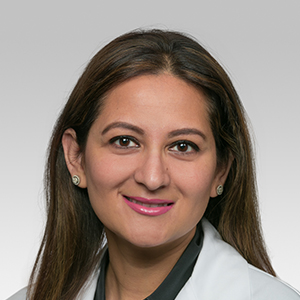Myths About Diet and Your Thyroid
Updated March 2023
Can Food Impact Function?
The thyroid is a small, butterfly-shaped gland in the front of your neck. It’s a misunderstood part of the endocrine system often blamed for weight gain.
“There are many misconceptions about the thyroid, specifically around diet,” says Northwestern Medicine Endocrinologist Ayla Bakar, MD. “The bottom line is everything is fine in moderation, and food will not affect thyroid function for the most part.”
Dr. Bakar busts common myths about thyroid function and diet.
Food will not affect thyroid function for the most part.— Ayla Bakar, MD
Myth No. 1: You can’t eat cruciferous vegetables if you have a thyroid disorder.
Cruciferous vegetables, which include broccoli, cauliflower, Brussels sprouts and kale, have been thought to interfere with how your thyroid uses iodine. Iodine plays a role in hormone production in the thyroid gland. The truth is, you can — and should — eat these veggies.
“Cruciferous vegetables are part of a healthy and balanced diet, and I encourage patients with thyroid disorders to continue eating them in moderation,” says Dr. Bakar. “You would have to consume an excessive and unrealistic amount of these vegetables for them to interfere with iodine and thus hormone production in the thyroid.”
Myth No. 2: You should take iodine supplements if you have an underactive thyroid (hypothyroidism).
You do not need to supplement iodine if you live in the United States or other first world countries where iodine is added to many foods, including table salt. While iodine deficiency is one cause of hypothyroidism, if you are not iodine-deficient, there is no need to take iodine supplements, commonly seen as kelp supplements.
“Iodine supplements are a fallacy,” says Dr. Bakar. “In fact, they can start negatively affecting thyroid function if you take them without the guidance of a physician.”
Myth No. 3: A gluten-free diet can help with Hashimoto’s thyroiditis — or cure it.
Hashimoto’s thyroiditis is the most common cause of hypothyroidism. A gluten-free diet cannot reverse Hashimoto’s.
“There is a lot of inaccurate information out there about a gluten-free diet and Hashimoto’s,” says Dr. Bakar. “I believe this stems from the fact that both Hashimoto’s and celiac disease, where gluten intolerance is the primary symptom, are both autoimmune disorders.”
Celiac disease can coexist with Hashimoto’s. In this case, patients would need to adhere to a gluten-free diet to manage their celiac disease, not Hashimoto’s.
Myth No. 4: My weight gain is from hypothyroidism.
There may be weight gain associated with an underactive thyroid, but it’s typically only 5 to 7 pounds.
“Significant weight gain beyond this has nothing to do with thyroid function,” says Dr. Bakar. “To avoid weight gain, I tell patients with hypothyroidism to monitor their portion sizes and calories, and to avoid empty calories from, say, sugary beverages.”
Myth No. 5: People with thyroid disorders need to be on special diets.
“Like everyone else, people with thyroid disorders need to eat a healthy, well-balanced diet,” reiterates Dr. Bakar. “Diet will not make your thyroid disorder go away and will not cause thyroid disorders.”






